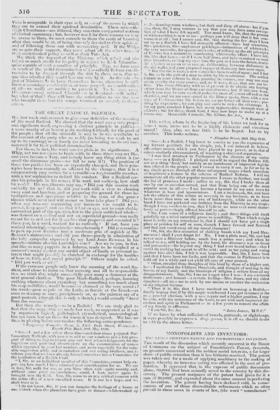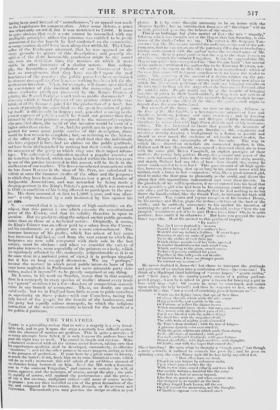MONOPOLISTS AND INVENTORS:
hiNG.s PRINTER'S PATENT AND rothaintlsosers ltevesertoN.
Toe result of the discussion which recently occurred in the Houk of Commons on the subject of Fourdrinier's Patent, demands, on grounds connected with the noblest social interests, a far larger share of public attention than it has hitherto received. The pateut was taken omit for a mode of applying machinery to the making of paper, whereby an immense saving was effected in the cost of pro- duction. It appeared that, in the expense of public documents alone, e0,000/, had been annually saved to the country by this dis- covery. The present assignees of the patent had given for it a sum of 30,0001., and expended about the same amount in perfecting the invention. The patent havinr, been declared void, in conse- quence of one of those discreditable refinements which so often prevail in these cases in courts of law, (the word " manufacture" haring been used instead of " manufactures,") all appeal NN as made to the Legislature fin. compensation. After some debate, a grant was reluctantly awardcd, but it was restricted to 7,000/. It must be quite obvious that such a vote cannot be reconciled with any intelligible principle: either the patentee wad entitled to be jostly remunerated for the benefit he had conferred on the coninninite, er compensation SIIOUld have been altogether withheld. 'l'hc Chan- cellor of the Exchequer obierved, that he was opposed on ab- stract grounds to grants of this description : and po.,;(ily the opinion of the ry:ht.lionourable gentleman might be ties sound one, were no dsvietion from tlze niaxims on which it reels tisible in other instances of a similar nature. But, unhap- pily, the favouritism and profusioo of our Otsverietwot hate been an conspicuous, that they have recoils -I main the real beeetlIctors of the counts' : the public purse has been so draimal by obscure nioeopolists, Vast it scams nothing leis becit left for time meritorious inventor. \Vied, for example, will future agea think of the coexistence of incident with time monis:ming and most mliots, exclusive privib ssss poasesstsl by the King's Print( r. of Fdutieg the Sacred ls'esia!ssees and various public doemnents ? A discovery which rsductsi time cost of r.ny portion 'Athor or tub& or of' the labour r. quired the production ref a boo'; has a merit of precisely the ...on:: kind lei the great in% entitm of print- ing itself: it ditnsra only in degree ; and, provided a sac i;ig in the resent expense of 1,1-i!,.111 4 could be fiaind out greater than that attained by the first printers compared to the numuseript-copiers who pretsaled them, the merit of the inventor would be even cif a higher order than theirs. Now, had the privileges in qucstion been granted thr some great public service of this description, there would be less reason to complain ; but, on referring to the history of the office of King's Printer, we shall find that the individuals who have enjoyed it have had no claims on the public gratitude, and have been distinguished by nothing but timely servile support Of the measures of the party to which they owe their unjust advan- tages. The celebrated combination against a popular exercise of the tisawhise in Ireland, which was headed within the last tell years by oue of the parties interested in this patent, will be fresh in the recollection of our readers. Tile less-retnembered transactions with the late .lons; Itenvns in the titne of Mr. Prrr, are calculated to exhibit at once the immense profits of the office and the purposes to which they have been abused. Rica ES was a great founder of Antijaeobin Associations, and was rewarded by being made a sleeping-partner in the King's Printer's patent, which was renewed in 1799 on condition of his being allowed to participate in the pro- fits. His share amounted at first to 1 aRl0/. a year, and was after- wool- g vatly increased b.) it suit instituted by him against his par pers, assured that it is the opinion of high authorities on the subject, that this patent is one which exceeds the constitutional power of the Crown, and that its validity therefore is open to question. But we prefer treating the subject on fair public grounds, rather than on those of a technical nature. Originally, it seems, the King's Printer was au officer paid by a salary from the Crown ; and his emoluments as a printer are a mere encroachment. The immense increase of his profits, which has arisen of hate years front increased legislation, sod from the vast extent to which the Scriptures are now sold compared with their sale in the last century, must be obvious : and when we consider the variety of particular interests, more especially of' the printers as a body, which are injuriously affected by this monopoly, (objectionable as it is at the same time in a national point of view,) it is perhaps singular that it has so long escaped discussion. We say " perhaps," because the manner in which great public interests have of late years been neglected in Parliament tiir mere miserable party skir- mishes, makes it impossible to be greatly surprised at any thing. Mr. LAING, in his work on Sweden, states that in that country there is a monopoly ill every species of traffic: almost every trade is a "patent" risdrieted to as few—freedom of competition scarcely exists in any branch of' commerce. These, no doubt, arc great social evils : but we in England have little reason to pride ourselves on. superiority on these points—with our Corn-laws, taxing the daily bread of the people: tiir the benefit of time landowners, and this petty but equally odious monopoly, by which the religions Instruction of the whole community is taxed for the benefit of a few political parti RMS.



























 Previous page
Previous page